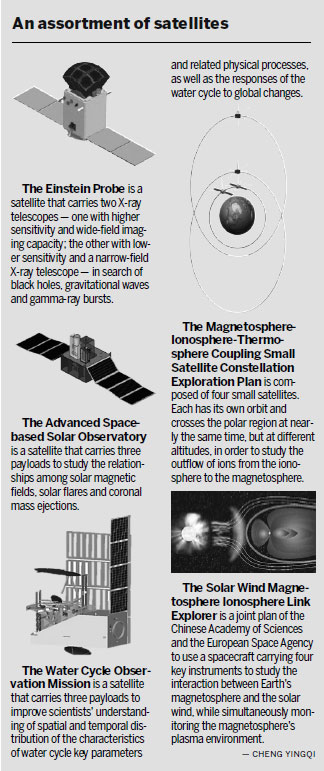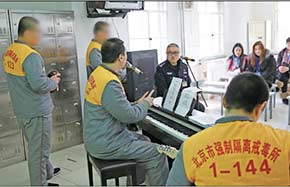Space exploration program launched
Researchers are already submitting ideas for projects for the 14th and 15th Five-Year Plan
The National Space Science Center affiliated to the Chinese Academy of Sciences has officially launched a program consisting of five space exploration projects to be accomplished during the 13th Five-Year Plan (2016-20).
The projects involve a series of satellites and a spacecraft to study solar-geophysical activity, the water cycle on Earth, and cosmogenic origin of black holes, gravitational waves and gamma-ray bursts.

"President Xi Jinping spoke of the importance of space exploration at a major sci-tech conference on May 30. It is necessary to promote the all-round development of space science, space technology and space applications via initiating these projects," said Xiang Libin, vice-president of the Chinese Academy of Sciences.
The five projects were selected from a number of candidates sponsored by the academy's Strategic Priority Program on Space Science over the past five years.
"Under the State-funded Strategic Priority Program, we have already launched three satellites into space, achieving significant research results, which will be released in the coming few months," Xiang said.
China's first Dark Matter Particle Explorer satellite was launched in December last year, followed by the Shijian 10 satellite, which was launched and recovered in April, and the Quantum Experiments at Space Scale satellite that was launched in August.
"The research, design, production and launch of scientific satellites are a prolonged process that usually takes five to 10 years. A program that provides continuous support to promising projects means space scientists across the country are given a stable channel to demonstrate their ideas step by step," Xiang said.
The center has also begun soliciting research ideas from all space science institutes across China.
Researchers are able to submit an introduction to their research ideas to the center by the end of December. After the first round of expert reviews, the ideas with prospects for study will receive grants from the center for up to six months of in-depth study to form detailed research plans, some of which will be chosen as candidates for the country's 14th Five-Year Plan (2021-25) or 15th Five-Year Plan (2026-30) on space exploration.
"The primary criteria for selecting a candidate project is the prospect of scientific achievement," said Wu Ji, director of the National Space Science Center.
According to Wu, international research frontiers include cosmogenic origin and solar-geophysical activity.
"However, this is a bottom-up application process instead of a top-down deployment process, which means we have no intention of starting projects that cover all international frontiers. We will only chose projects that Chinese scientists have an interest in and research capabilities to perform," he said.
The satellites, when launched, will work in coordination with scientific facilities on Earth.
"For example, we have sent some researchers to work with the Laser Interferometer Gravitational-Wave Observatory - which detected gravitational waves in February - in the United States. In the future, once waves are detected on the ground, we will turn our satellite immediately in the given direction to obtain more accurate data," Wu said.
(China Daily 12/02/2016 page4)

























